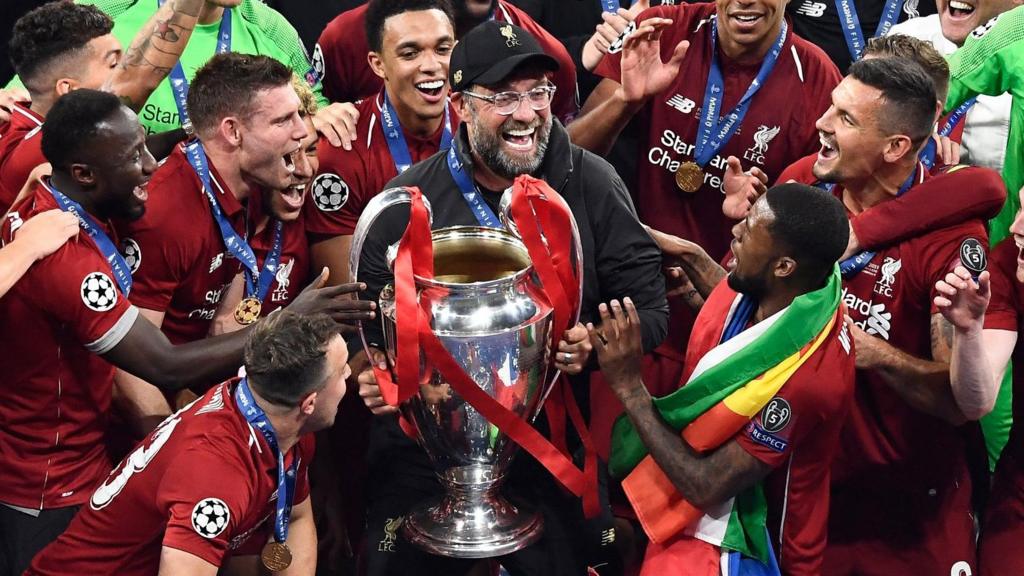Jurgen Klopp celebrated his inaugural trophy at Liverpool with their triumph in the 2019 Champions League final.
Jurgen Klopp’s decision to depart Liverpool in January 2024 resonated throughout the football world as a genuine surprise.
Emotions ran high during his Anfield farewell in May, with both tears and anxieties about the future prominent amongst Reds supporters as Arne Slot prepared to assume the helm.
Those fears have proved unfounded, as Slot has since guided Liverpool to a record-equalling 20th league title.
Yet, while Slot’s tactical acumen has defined Liverpool’s latest campaign—a fact he acknowledged after securing the championship on Sunday—the squad’s foundations were unmistakably shaped under Klopp’s stewardship.
With only one new arrival this season in Federico Chiesa, who contributed in a limited capacity, Liverpool matched the league title record long held by arch-rivals Manchester United.
BBC Sport, through its BBC iPlayer documentary on Liverpool’s Champions League journey in 2018-19, traces Klopp’s appointment and the legacy he established for Slot to develop.
When searching for Brendan Rodgers’ successor, Liverpool’s “two main candidates,” as recounted by former head of research Ian Graham, were Klopp and Carlo Ancelotti, both of whom were out of contract at the time.
Ancelotti brought a reputation as a “great coach,” but Liverpool lacked the “squad full of established superstars” he was typically accustomed to leading.
In contrast, Klopp’s achievements at Borussia Dortmund, winning consecutive Bundesliga titles with a youthful squad in 2011 and 2012, made him a more suitable candidate.
“Our approach was to sign young talent, aiming for collective peak performance a few years down the line,” Graham explained.
Klopp arrived at Anfield in October 2015, with Liverpool in 10th place, introducing a cultural shift and an enduring philosophy that Slot has since embraced.
“We always wanted to create stories to share with our grandchildren,” shared Peter Krawietz, Klopp’s long-serving assistant at Mainz, Dortmund and Liverpool.
“There’s only one way: work as a team. Support one another as friends, as a family.
“Recognise the essential support from every member—the analysts, the medical staff, the nutritionists.
“Our collective effort is the key. Isolation offers no path forward.
“Persist, pursue your ambitions, and never give up—success will follow, even without a guarantee.”
How to Win the Champions League
Liverpool
Despite continual efforts, tangible silverware initially eluded Liverpool.
The club amassed 97 points in the 2018-19 season— a tally sufficient for the title in most campaigns—only to be edged out by Manchester City.
Final defeats in the League Cup and Europa League in 2016, followed by the 2018 Champions League final, further fueled their resolve.
Patience was ultimately rewarded as Klopp secured his first Liverpool honour—a 2-0 victory over Tottenham in the 2019 Champions League final.
That journey epitomised the intensity, tactical innovation and emotional connection Klopp instilled—principles that Slot has subtly evolved rather than overhauled.
“We seek to limit our opponents, dictating the play even before we have the ball,” said Krawietz. “Once we win possession high up the pitch, the primary objective is to attack decisively.
“Over time, we adapted, always learning yet never deviating from our fundamental beliefs.”
He added: “As coaches, we were committed to our philosophy.
“It was just as important to win the players’ conviction, and eventually to turn external skepticism into belief.”
While Klopp’s football could be “wild” at times, Krawietz insisted this unpredictability was an intentional aspect—never more so than during the 2019 Champions League semifinal against Barcelona.
Trailing 3-0 after the first leg at Camp Nou, Liverpool produced one of the competition’s most remarkable comebacks at Anfield.
“Immediately after the match, Jurgen was adamant: ‘This tie isn’t over. We may be 3-0 down, but we’re Liverpool and the second leg is at our home’,” Krawietz recalled.
“For us, football involves both tactics and heart.
“While we provided strategy and guidance, encouraging players to feel the intensity of the occasion—with fan support and Anfield’s unique spirit—was always pivotal in our approach.”
This video can not be played
‘It’s like a father hugging the son’ – Alisson and Robertson on Klopp’s hugs
Internal data suggested Liverpool’s prospects of overturning Barcelona were just 3.5% before the return leg—yet, as Mohamed Salah’s T-shirt declared, Klopp’s side would “never give up.”
Divock Origi struck early, Georginio Wijnaldum—frustrated at being left out of the starting XI—then leveled the aggregate before the decisive, innovative corner kick routine.
As Barcelona were caught unprepared, Trent Alexander-Arnold’s quick-thinking delivery found Origi, sealing a 4-0 win and passage to the final amidst wild celebrations.
“I later learned our analysts had identified Barcelona’s weakness: they were distracted defending corners,” Graham said.
“Their tendency to argue rather than organise at set-pieces was exploited by Trent and Divock, who had been briefed accordingly.
“Kudos to the analysts and the players for executing this perfectly.”
Liverpool proceeded to defeat Tottenham, earning their sixth European Cup.
“Playing for Jurgen is straightforward—his motivation inspires players to give everything. And he reciprocates that commitment,” said Andy Robertson.
“He exuded warmth, often greeting players and staff with a hug.
“He ensured everyone felt included, making the training ground an environment charged with positivity and drive.”
Although Klopp has since departed, his legacy of unity and shared purpose endures at Liverpool, as exemplified by the squad throughout the current season.
Goalkeeper Alisson added: “Jurgen always chose the right words before games. He has an innate gift for inspiring everyone before a match.”
How to win the Champions League: Liverpool 2019
Latest Liverpool news, analysis and fan views
Get Liverpool news sent straight to your phone

